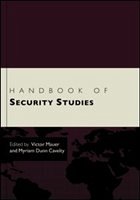Nicht lieferbar

Handbook of Security Studies
Versandkostenfrei!
Nicht lieferbar
The Routledge Handbook of Security Studies is a comprehensive collection of cutting-edge essays on all aspects of this subject by a mix of established and up-and-coming international scholars.Security studies as a sub-field of international relations has undergone significant change during the past twenty years, and is now one of the most dynamic disciplines within the field of International Relations. The Routledge Handbook of Security Studies is a comprehensive collection of cutting-edge essays on all aspects of this subject by a mix of established and up-and-coming international scholars. I...
The Routledge Handbook of Security Studies is a comprehensive collection of cutting-edge essays on all aspects of this subject by a mix of established and up-and-coming international scholars.
Security studies as a sub-field of international relations has undergone significant change during the past twenty years, and is now one of the most dynamic disciplines within the field of International Relations. The Routledge Handbook of Security Studies is a comprehensive collection of cutting-edge essays on all aspects of this subject by a mix of established and up-and-coming international scholars. It identifies the key contemporary topics of research and debate today, taking into account that the study of international security has undergone dramatic changes since the end of the Cold War. Security studies now also encompasses dangers ranging from pandemics and environmental degradation to more traditional concerns about direct violence such as posed by international terrorism and inter-state armed conflict. With its focus on contemporary challenges, this Handbook offers a ground-breaking and wide-ranging collection of essays on security studies.
The volume will have six parts. The first section reviews the historical roots of the field; the second looks at a wide variety of theoretical positions; the third focuses on different conceptions of security; the fourth addresses a number of contemporary security topics, including terrorism, climate change and other topical issues; the fifth analyses specific regional security issues; before the sixth examines the tools and instruments in place to counter these security challenges.
This Handbook will be essential reading for all scholars and students of Security Studies, War and Conflict Studies and International Relations in general.
Security studies as a sub-field of international relations has undergone significant change during the past twenty years, and is now one of the most dynamic disciplines within the field of International Relations. The Routledge Handbook of Security Studies is a comprehensive collection of cutting-edge essays on all aspects of this subject by a mix of established and up-and-coming international scholars. It identifies the key contemporary topics of research and debate today, taking into account that the study of international security has undergone dramatic changes since the end of the Cold War. Security studies now also encompasses dangers ranging from pandemics and environmental degradation to more traditional concerns about direct violence such as posed by international terrorism and inter-state armed conflict. With its focus on contemporary challenges, this Handbook offers a ground-breaking and wide-ranging collection of essays on security studies.
The volume will have six parts. The first section reviews the historical roots of the field; the second looks at a wide variety of theoretical positions; the third focuses on different conceptions of security; the fourth addresses a number of contemporary security topics, including terrorism, climate change and other topical issues; the fifth analyses specific regional security issues; before the sixth examines the tools and instruments in place to counter these security challenges.
This Handbook will be essential reading for all scholars and students of Security Studies, War and Conflict Studies and International Relations in general.



